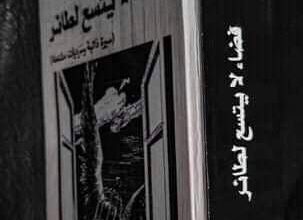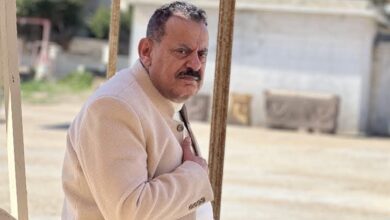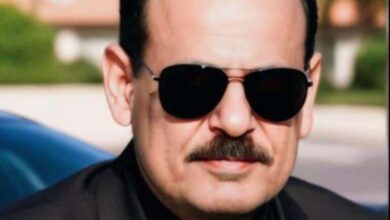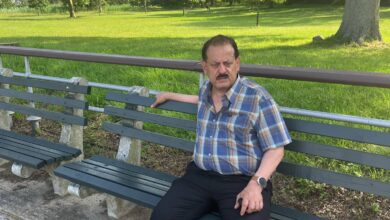A Fairy” Loves My Father
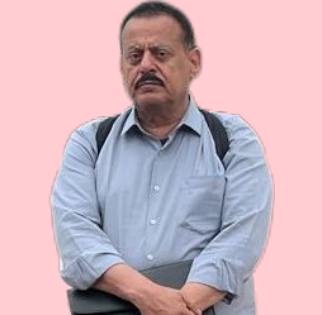
Yemeni mp
Ahmed Saif Hashed
When I was a child—I can no longer recall my exact age—perhaps six or a little younger or older, I was afraid and lived in terror of jinn and darkness. I would hear my mother talk about the jinn of “Al-Dajina” near her family’s old home, and about the jinn women whose breasts hung low and draped over their backs. I also heard about my uncle, who tried to control the jinn with the book “Shams al-Ma’arif,” nearly driving himself mad as he heard the jinn racing like horses on the roof of his solitude in “Jalab” in the “Mujir” region.
I would also listen to my father talk about jinn, recounting tales about them—the beautiful, slender fairy who would stop cars late at night on “Aqbat Aden,” then get into the car with the driver, exuding perfume and magic, only for him to eventually discover that she had the legs of a donkey. Sometimes, she would suddenly disappear from the vehicle, leaving the driver shocked by her vanishing, driving him to madness. There were stories of women by the well, drawing water in the darkness of night, their breaths echoing as they worked, and as soon as someone approached, they would vanish abruptly, leaving him in a state of terror. These were many tales I heard, tales that a child of my age should not have been able to bear.
I trembled with fear, and dark tunnels opened in the walls of my silence. I imagined the world of jinn, gripped by the fear that they might snatch me away from my mother into a realm of terror and the unknown. Every word in each tale quickly found its place in my consciousness, leaving an impact as powerful as an earthquake. What they recounted painted vivid images in my mind, as if I were a receiver of broadcasts or a radar swiftly picking up immense horror.
Those stories whisked me far away, transporting me into an unknown and alien space, far from my small world. As I listened to those tales, I existed with the mind of a child, my little heart pounding within me to the point of almost shattering. I witnessed overwhelming shifts within myself; my awareness became saturated with terrifying and dreadful thoughts. Yet, I tried to suppress the turmoil inside, concealing the fear that shook me from within, wrapping it away in a silent hush.
I felt loneliness, fear, and terror as they spoke of jinn and demons. The darkness frightened me, and the staircase of our old house loomed like a thick black snake, twisting around the heart of the home, save for a faint glimmer of light that weakly filtered down the stairs from two small windows in the wall.
Whenever I ascended or descended the stairs alone, I would run like the wind, not daring to look back, desperate to escape and avoid the grasp of a jinn or a demon. I believed that jinn lurked in the dark corners of the staircase, waiting for me. During those early years, I endured a daily struggle with the jinn, the stairs, and the darkness. Climbing or descending the stairs alone made me feel as though I had escaped the jinn, if only I could make it through.
* * *
Why was it that while I was in my mother’s womb, I feared not the darkness, but once I emerged and became a child, I came to dread it? Is it awareness? Why does a person grow to fear the light that reveals their flaws and uncovers hidden truths? Why do we drown ourselves in hypocrisy, both towards ourselves and even more so towards tyrants, oppressors, and pretenders?!
Why don’t we reconcile with ourselves and with the truth, whatever it may be, instead of living our falsehoods in a deceptive happiness? Why do we engage with lies as if they were the truth, avoiding light or even opposing it, unless it becomes an unavoidable fate or a reality we must face? Why do we seek refuge in darkness, searching for a false sense of security?!
Striking paradoxes abound: a fetus unaware of darkness, a child afraid of it, a man who fears the light, a poor soul grown to dread the exorbitant electricity bills during times of siege and corruption. Even more, there are people who fear enlightenment and stifle their thinkers out of fear for the future, for the truth, as it often shocks their beliefs, leading them to cling to what is false, deceptive, and untrue.
These are people who live in their darkness with resignation, even with a calm that envelops their consciousness, reveling in their alienation from the present with profound joy. They find solace in what is false and deceptive, as it provides them a sense of security, even if it is merely an illusion built upon illusion …!
People who live in fear of the truth until they are confronted by it, without ever pushing themselves to seek it out first. Their fear stifles their awareness, leading them to cling to a false and deceptive safety. The truth terrifies them, and most of our societies embody this reality.
* * *
When I moved into our new home, which was built in phases, it was then a shop with a sitting room above, its door still open or missing altogether, save for a bundle of mats that were rolled up at dawn and returned before sleep or shortly after nightfall. In its entrance, there was a small kitchen tucked away in the corner.
We used to sleep in the sitting room, leaving a lantern dimly lit during the night. One night, my father and I awoke in a panic at the sound of my mother rushing towards us, pleading and calling out in a flustered haste: “Help! Help! The stone, the stone.
My mother had seen a hand throwing pebbles at us from the side of the stairs next to our small kitchen. She had caught a glimpse of a face hidden behind a veil, like a ghost, though it was not a ghost. She was close in her estimation of reality, but she missed the mark. She came to us in terror, her mind nearly unraveling from fear.
My father sprang from beneath his blanket like a sprite at the sound of my mother’s panic. I don’t know how he managed to gather his scattered thoughts in such a confusing moment. As for me, I was stunned and filled with dread, as if a calamity had descended upon us from the sky. I only grasped what had happened after everyone’s fear began to subside.
My father rushed with his semi-automatic rifle toward the direction my mother pointed with both hands, though I could no longer understand her words due to her overwhelming confusion. Strangely, the apparition was the only one who appeared composed and calm.
My father aimed the rifle at what seemed to me a ghost dressed as a veiled man, while the figure, with a feminine voice, poured forth warmth and femininity. It was trying to soothe our fears, assuring us that it was “so-and-so,” introducing itself in a way that would calm our hearts.
We discovered that she was a woman exuding femininity—graceful, beautifully adventurous, cloaked in men’s attire in the depths of the night. Even now, my memory can still evoke her voice, flowing with love, longing, and desire. She was tall, her movements as elusive as a sea breeze, filled with affection, whispers, and many words.
Afterward, my mother unleashed a storm upon my father. It was perhaps the first time I witnessed my father appearing weak before her, pleading and begging. My mother set up a court for my father, beginning with a stern demeanor, while he defended himself with patience, entreaties, and earnest oaths, trying to stave off what could become a resounding scandal that night.
My father defended himself, claiming innocence of the accusation; otherwise, he would have arranged a time to meet her away from my mother’s eyes. He knew that what had happened could turn into a scandal among people, so he gathered arguments, evidence, and solemn oaths to dispel the charge that was on the verge of becoming a visible crime.
During the trial, I heard my father accuse someone of having urged her to do what she did, boldly demanding from him what he had given her the previous day. She spoke without shame, claiming it as if it were her right. That woman was stunningly beautiful, and my father was handsome, even more so than her companion.
That night, my father earned a semblance of acquittal—perhaps half or a little more—while the remaining feelings of jealousy and suspicion toward him lingered. Most importantly, my mother managed to resolve the issue with my father following the hasty trial, which prevented her from leaving the house and fleeing to her family’s home—a possibility that had been imminent at the onset of the revelation.
Yet the lover’s attachment to my father persisted, as she proposed marriage and sought to appease my mother for such a union and coexistence. However, she never secured my father’s approval. After much despair and rejection, she lamented.
,”Pure of body, oh perfume in a bottle”
Your desires are a passion I neither crave nor wish for marriage.
* * *
And the wonder remained… What a courageous lover she was, in a night steeped in the fiery tumult of passion. A journey of love from formlessness and explosion to the emergence of existence that defies the void. How can we endure this arduous test when such abundant beauty challenges its barriers? Love established itself deep within us, to the point where its destinies became greater than this existence that births all creatures.
Beauty transcends the boundaries of death to unite with those we love and cherish. A seduction worthy of our crossing, and a sin akin to knowledge, deserving of sacrifice. We are victims of our existence. I do not deny its grace, but I seek to understand the lovers’ justifications for their proximity to death. How difficult it is to witness this exquisite beauty from the balcony of the universe and not fall in love with it. How can a butterfly see all this light without flying toward it and surrendering to its fate.
I have always wished for “spirits” to be like this beautiful lover. How I long for them to lurk for us in every night and darkness! I wished for them to grow more eager and yearning, visiting us each night in our beds with passion and wonder. Without doors or appointments, I wished even more for them to inhabit our homes throughout our dark nights, while we dwell in their hearts during the daylight hours.
This fervent love and its exquisite beauty elevate existence in supplication to the Lord of this miracle. We declare it with a voice choked and protesting: no matter how you cast “spirits” aside with all your accusations and blame, they, in their worst state—if we assume it to be true—are a thousand times better than what some of humanity does to us
Love and longing that defy death, and the dangers that surround us. An adventure disguised in the depths of a dark night. A suffocating crossing to reach those we cherish. A love fraught with peril, challenging the clamor of scandal, the threat of being shot, and the death penalty by stoning. Blessed be the spirit of Christ, who said: “Let him who is without sin cast the first stone.
Peace to the spirits that inhabit their kingdoms of love from the beginning of the night to its end. Peace to her as she slips like a breeze beneath coats and blankets, fragrant with love, flowers, and perfume. Disguise is a greeting for crossing the minefields of watchful eyes, and encounters without appointments bring greater surprise and wonder.
Welcome to the spirits of love in the early night or in its depths… under its cloak or in its coat… in the night prayer or vigil. I do not deny God’s grace, but I simply hate war and compare its atrocities. War is a cosmic crime that destroys all blessings: it spills blood, kills life, crucifies love, and offends this magnificent existence. In these days that consume themselves and feed on us, we search for love but find it absent even in our dreams and dark nights. Our days are crowded with wars and graves—rivers of blood, tears of despair, hunger and famine that reach our throats.
We defend existence, accumulating life, love, and civilization, resisting our hunger and mortality, and this pandemic of death. We do not deny blessings, but we protest and pray earnestly. We cry out in the throes of death, seeking the salvation of our children from overwhelming ignorance and the broad encroachment of death threatening their existence, lineage, and sustenance. Famine is a catastrophe that overwhelms us daily with repetition and cruelty, a deadly siege from every direction, tightening its iron grip on our weary throats, so the world cannot hear our moans, our hunger, and our widespread tragedies.
With the voice of accumulated patience against this absurdity and this fierce war, we raise a cry that can shatter stone: Stop the war. Let us live. Let us love and cherish; for the crime of love, no matter how deep, is a million times less than war. The true criminals are those who take pleasure in killing, spill blood, violate rights, and trade in death as if it were a thriving business, not those who burn in the furnace of sweet love.
“Stop the war” is a cry we launch from our depths as we bear our coffins on our weary shoulders. We plead from the midst of the chaos of death, this catastrophic war that refuses to end. A world parched and rocky in conscience, yet perhaps our bet on the remnants of a tender conscience will accomplish something against the wide expanse of death, this war, and the great destruction and ruin.
I have not lost faith while hunger rages, nor have I denied blessings in the night or day, as war crushes joints and bones. Yet I protest bitterly, like one who carries his coffin and feels his spirit rise, against those who see the splinter in their brother’s eye but do not see the beam in their own. Those who view love as a crime the size of the sky, and see war as a struggle, forgiveness, honor, and sovereignty.
* * *


